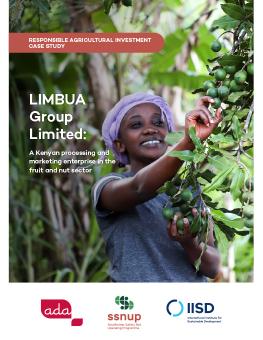
LIMBUA Group Limited
A Kenyan processing and marketing enterprise in the fruit and nut sector
This case study analyzes the extent to which a small agribusiness in Kenya complies with international standards for responsible investment in agriculture.
Responsible investment in and by agribusinesses—including crop producers, processors, and traders—can play a transformative role in driving innovation in agrifood systems, building market and supply chain linkages, and contributing to local economies and communities. These outcomes can be enhanced when agribusinesses align their policies, operations, and practices with the Committee on World Food Security’s Principles for Responsible Investment in Agriculture and Food Systems (CFS-RAI).
The agribusiness in this case study, LIMBUA, is supported by the impact investor Incofin as part of the Smallholder Safety Net Up-scaling Programme (SSNUP). This program brings together investors to promote sustainable, climate-smart farming practices and improve food security and living standards in developing countries. It is part of a series aimed at analyzing how well SSNUP investees perform and comply with international standards for responsible business conduct, such as the CFS-RAI.
LIMBUA is representative of small and medium-sized processing and marketing enterprises in Kenya and operates in the fruit and nut sector. It faces several challenges—from competition for farmer crops to difficulty in accessing local finance and climate-related production uncertainties. It sources its products from local farmers who are certified both organic and Fairtrade. The company provides advisory support on correct organic production techniques, as well as on good agricultural practices for food crops produced for home consumption and the local market.
We measured LIMBUA’s compliance with principles for responsible investment across seven key dimensions. Overall, the company demonstrates a high level of compliance and offers a learning opportunity for other companies. Its operations and processes are relatively honed to ensure responsible and sustainable business conduct at all levels. This is due to conscious choices from the outset to set very clear goals and expectations, develop an innovative business model, and work with stakeholders who could support their aims in the short and long terms.
The case study nevertheless makes several recommendations to LIMBUA, its investors, the government, and other stakeholders to make further improvements. These include suggestions for LIMBUA to boost employees’ understanding and approach to organic farming and to support farmers with seasonal cash flow challenges. It also encourages investors to consider further capital investment to support the company’s continued expansion and diversification.
Participating experts
You might also be interested in
Responsible Agricultural Practices of a Cocoa Buying Company in Ghana
This case study analyzes the extent to which a small cocoa trader in Ghana complies with international standards for responsible investment in agriculture.
Mahembe Coffee
This case study analyzes the extent to which a small agribusiness in Rwanda complies with international standards for responsible investment in agriculture.
Sénégalaise des Filières Alimentaires
This case study analyzes the extent to which a small rice miller in Senegal complies with international standards for responsible investment in agriculture.
Tropic Coffee
This case study analyzes the extent to which a small coffee processor and trader in Rwanda complies with international standards for responsible investment in agriculture.